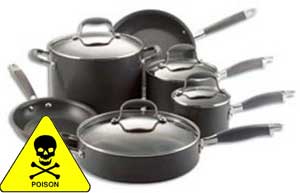Aluminum
Contents
Description
Aluminum is the most abundant metal found in the earth’s crust and the third most abundant element on the earth's surface, exceeded only by oxygen and silicon. This metal is never found naturally by itself in a pure state, but bonded with other elements to form compounds. The most frequently encountered compounds are alum and aluminum oxide. Although aluminum is also considered a trace mineral, it can be dangerous and even fatal if consumed in excessive amounts. It has no established function in human nutrition.
Extracted in 1825 by Hans Christian Oersted, a Danish chemist, aluminum has been found to possess the valuable properties of being soft, lightweight, durable, non-magnetic and resistant to corrosion. These characteristics make it ideal in the manufacturing of a wide variety of items utilized in daily life including aluminum foil, tools, appliances and cookware such as pots and pans.
Uses
Some common uses of aluminum are packaging-related such as drinking cans, foil wrap, and storage containers. It is also used in other applications such as electrical power lines, airplanes, cars, trains, satellite dishes, sporting equipment and more.
Around the house aluminum can be found in roofing, siding, door frames and knobs, saucepans, grills, kitchen utensils, furniture, refrigerators, toasters, light bulbs, ladders and railings.
Sources
We are surrounded in our daily lives with an abundance of aluminum sources which include cars, tools, appliances, cookware and it's even present in our drinking water and some foods. The toxicity, side effects and risks of aluminum usage in such high levels is a topic of heavy debate and controversy.
Aluminum is used so commonly it is even found in baking soda and most deodorants, toothpastes and food additives. Also, low levels may be found to exist in certain herbs and tea leaves. Some research studies show evidence that high aluminum content in the human body is toxic, and can pose certain medical risks and damage.
Side Effects & Risks
There are many recent studies that link aluminum to a variety of health concerns including Alzheimer’s disease, dementia and other nervous system illnesses, diseases and conditions.
Aluminum toxicity is highly debated and researched as to the harm it poses to humans in terms of everyday consumption and absorption. Excessive amounts in the body may be exhibited by symptoms similar to poisoning, these include constipation, colic, loss of appetite, nausea, skin ailments, muscle spasms and loss of energy.
Research shows that health issues such as bone disease, chronic renal failure, certain cancers or related complications may result from long-term occupational exposure to aluminum, or being injected with vaccines that contain this metal.
Cautionary Measures
There's a variety of cautionary measures any one person can take to avoid negative consequences of diseases or illnesses posed by aluminum. Some measures you can take to protect yourself and your family include using deodorants and other personal care products that are organic and aluminum free, like aluminum free baking soda and antacids.
Going green and organic can usually ensure you're contributing to an aluminum-free lifestyle. Limit your dietary intake of aluminum as much as possible and drink filtered water. Foods prepared in aluminum cookware or bakeware may absorb small quantities of this mineral, therefore introducing it via the food into your system.
It's recommended to consult with a physician if you have any questions about these measures, or if you suspect you may be experiencing any form of aluminum toxicity. Also, it's prudent to research in advance, the ingredients in any vaccinations that you're planning to receive.
Related Discussions
- The Aluminum - Magnesium Link
- Multiple Sclerosis - Aluminum toxicity?
- Consider the Cause of Alzheimer's Disease
